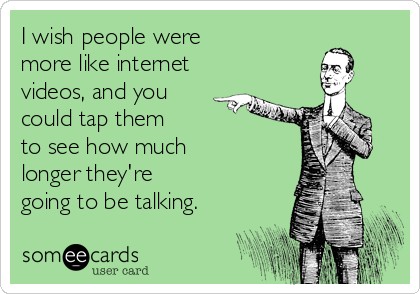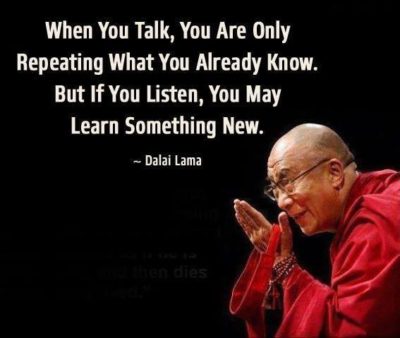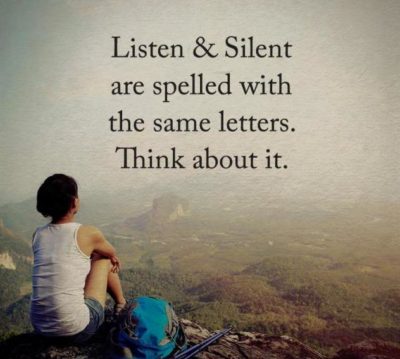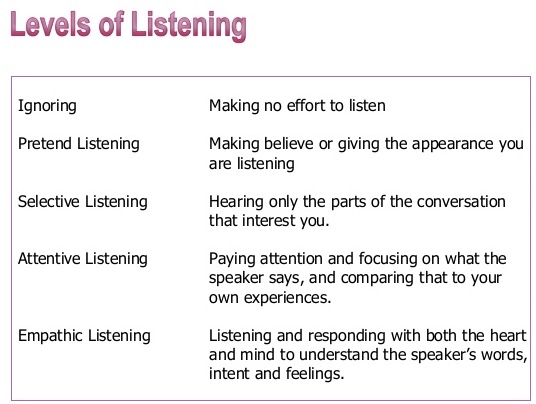
A good listener does not just listen with their ears but with their mind and heart. Deep listening is skill that can be learned with practice and inner work. We can be a good listener by withholding our judgement and staying open to what others have to say. (Estimated reading time: 8 minutes)
“The first duty of love is to listen.”
— Paul Tillich
Have you ever been around people who talk non-stop?
Trying to get a word in while having a conversation with them seems like a herculean task – they hardly let you open your mouth!
If you’ve ever been around such people then you know how draining and downright frustrating it is to be in their company. There’s only so much head-nodding you can do while listening to a barrage of platitudes. If you suspect that you’re one of those talkers then please read on.
Like everyone else, I was irritated whenever I found myself in the company of these overwhelming individuals but, over the years, I’ve become more understanding and able to handle them diplomatically.

People who like to attract all the attention by dominating conversations are coming from a place of egocentricity and a need for validation. Having an audience to listen to their problems, achievements and daily routines gives them pleasure and feeds their ego. They’re absolutely clueless about how off-putting their arrogance and spotlight-grabbing ways are to others.
They have the misconception that being verbose makes them good communicators. But a master communicator knows that the key to successful and respectful communication is to listen equally, if not more, when speaking with others. The most cultured, wise and erudite individuals do more listening than talking. They display poise, grace and humility.
Unfortunately, these people are hard to come by in today’s world. A study reported in the book Business Communications: Strategies and Skills, uncovered that the average person absorbs only 25% of what he or she hears. Based on these stats, it seems like a majority of us are missing out on key information and opportunities to build enriching connections.

In our quick-fix society, most people lack patience and have shorter attention spans than the generations before us. This is evident in the kind of media being consumed nowadays. Watch a classic Bogie movie or listen to a ballad from the 80s and you’ll notice that it has a slower rhythm with a stronger focus on conversation and lyrics than what we’re used to today.
The new media diet is leaner, bite-sized and visually driven to appeal to the newer generations need for brevity. In a fast-paced world where no one wants to slow down, be still and just listen; it’s refreshing to come across someone who is able to be fully engaged and present. Someone who listens, not with the intent to reply, but with the intent to understand and learn.
We’re living on the precipice of a new age of consciousness where it’s critical for us to learn to listen to one another, if we are to ensure the survival of our planet. World peace efforts and the conservation on the planet are issues that can only be tackled if we open our hearts and understand each other, instead of pushing our own agendas.
By listening to other parties and putting ourselves in their shoes, we become compassionate individuals, willing to work together to find a common resolution to resolve any conflicts in the negotiation process. But before we can do this on a macro level, it must first be tackled from a micro level, by firstly understanding what it means to be a good listener.

Listening is so much more than just the act of hearing what another person is saying. A good listener does not just listen with their ears but with their mind and heart. Compare how you listen when hearing rote instructions from a coworker and how you listen when hearing the words of a new love, and you’ll know the difference! In the latter, you engage in a deeper form of listening.
Listening attentively to another person requires that you do it in the spirit of honoring their perspective while expressing a genuine interest in them. You should spend more than half the time giving your undivided attention to your conversation partners and absorbing their point of view and reflecting on it.
I know this isn’t the easiest thing to do, especially after I completed my life coach training programs, which felt like attending a listener’s boot camp! Incisive listening skills is the cornerstone of a life coach’s toolkit to help clients. But I believe that all of us can become empathetic listeners.
During the coaching programs, we learned that there are 5 basic levels of listening, based on the work of Stephen R. Covey: ignoring, pretend listening, selective listening, attentive listening and empathetic listening. As coaches, we had to aim for the higher levels on this continuum.

In his book, The 8th Habit, Covey says, “To truly listen means to transcend your autobiography, to get out of your own frame of reference, out of your own value system, out of your own history and judging tendencies, and to get deeply into the frame of reference or viewpoint of another person. This is called empathic listening. It is a very, very rare skill. But it is more than a skill.”
There are tons of great resources on how you can improve your listening skills. Almost all the advice highlights the importance of using open body language to express interest and conversational tactics to engage in strategic dialogue, in the case of business relationships, and empathetic skills, in the case of personal relationships.
However, these superficial strategies will feel disingenuous to others if you lack self-confidence. It’s challenging to open our hearts when listening to others when we don’t feel good about ourselves. Our minds will wander off and drift towards thoughts about our problems and sense of lack.
That’s why engaging in a rigorous self-care practice is essential. Our self-care practice should include giving ourselves a safe space with someone that we trust and who is genuinely interested in supporting us.

Once you’ve filled your own cup, you’ll feel ready to venture out into the world and witness the lives of those that you encounter in your journey. Here are five ways that you will stand to benefit from being a good listener:
1. You’ll build deeper connections: Communication is the basis of any relationship. The quality of a relationship is based on both parties’ ability to understand one another. We can only cooperate with others if we listen fully and openly. Once you’re able to fully engage in active listening in your relationships with others, you are more likely to see the humanity in another person and understand things from their point of view. This will give you the ability to develop authentic and deeper connections. Your willingness to engage in an empathetic form of listening will make others feel comfortable, understood and supported in your presence.
2. You’ll be more likeable: Nowadays, it’s rare to meet people who can give us their complete attention. People are generally not used to being shown a high level of attention and respect in their interactions – that’s why, when you deeply listen to others in social situations, you’ll develop an edge that will make you stand out in the crowd. When you give others a chance to speak about themselves and show an interest in their life, they’ll instantly like you! Of course, you want to make sure that your interest is genuine, as you don’t want to come off as being insincere.
3. You’ll learn interesting things: You can learn something valuable from every single person that you meet, whether they are a street sweeper or the CEO of a tech giant. Everyone has a story from which we can learn and grow, if we’re willing to listen for the pearls of wisdom that are embedded between their words. Glean knowledge from others by focusing on what they’re saying (and not saying) to you, and ask questions based on what you want to know about them. Observe and be aware of both the words and feelings behind what they are saying. Be willing to go beyond your comfort zone and ask questions about anything that sparks your curiosity.
4. You become better at handling conflict: Engaging in a compassionate form of listening will improve your communication skills, especially in resolving conflicts and minimizing disagreements. You can listen for what’s truly important to others and find a middle ground where everyone agrees to compromise for the benefit of all those involved. Your discretion will balance out your communication, allowing you to speak intelligently and thoughtfully, instead of blurting out and reacting to what is said to you, especially in highly-charged issues that trigger you.
5. You’ll be able to pick up subtle signs and messages: Listening well is not limited to your conversations with other people. You should listen for the voices that are within you and around you in your environment. Stillness allows you to pick up on subtleties and nuances that can be easily missed if you’re only focused on yourself.
Great detectives such as Sherlock Holmes tapped into their intuitive senses and employed keen observation skills to catch clues and evidence that are less obvious to others. The universe is constantly sending us signs, hints and messages that can aid us in our life’s journey, and we’ll only receive them if, like Sherlock, we’re attuned to whatever is going on beneath the surface.
The ancient Greek philosopher Epictetus once said that there is a reason why we have been given two ears and one mouth – so that we can listen more than we speak. We’re on this planet to become a better and fuller expression of ourselves, and the only way we can do that is by being receptive to all the knowledge and wisdom offered by the people around us.
All my best on your journey,
Seline

Question for you: Do you consider yourself a good listener? At which level of listening do you usually engage in?
Did you like this post? Sign up below and I’ll send you more awesome posts like this every week.

I remember something my mother told me when I was growing up- that it is possible to hear but not listen and to look but not see and to touch but not feel. It is important to do more than just hear people and hear the noise that is around us but to listen and really pay attention to what is behind the word and the noise. Thank you for sharing this blog with the rest of us!